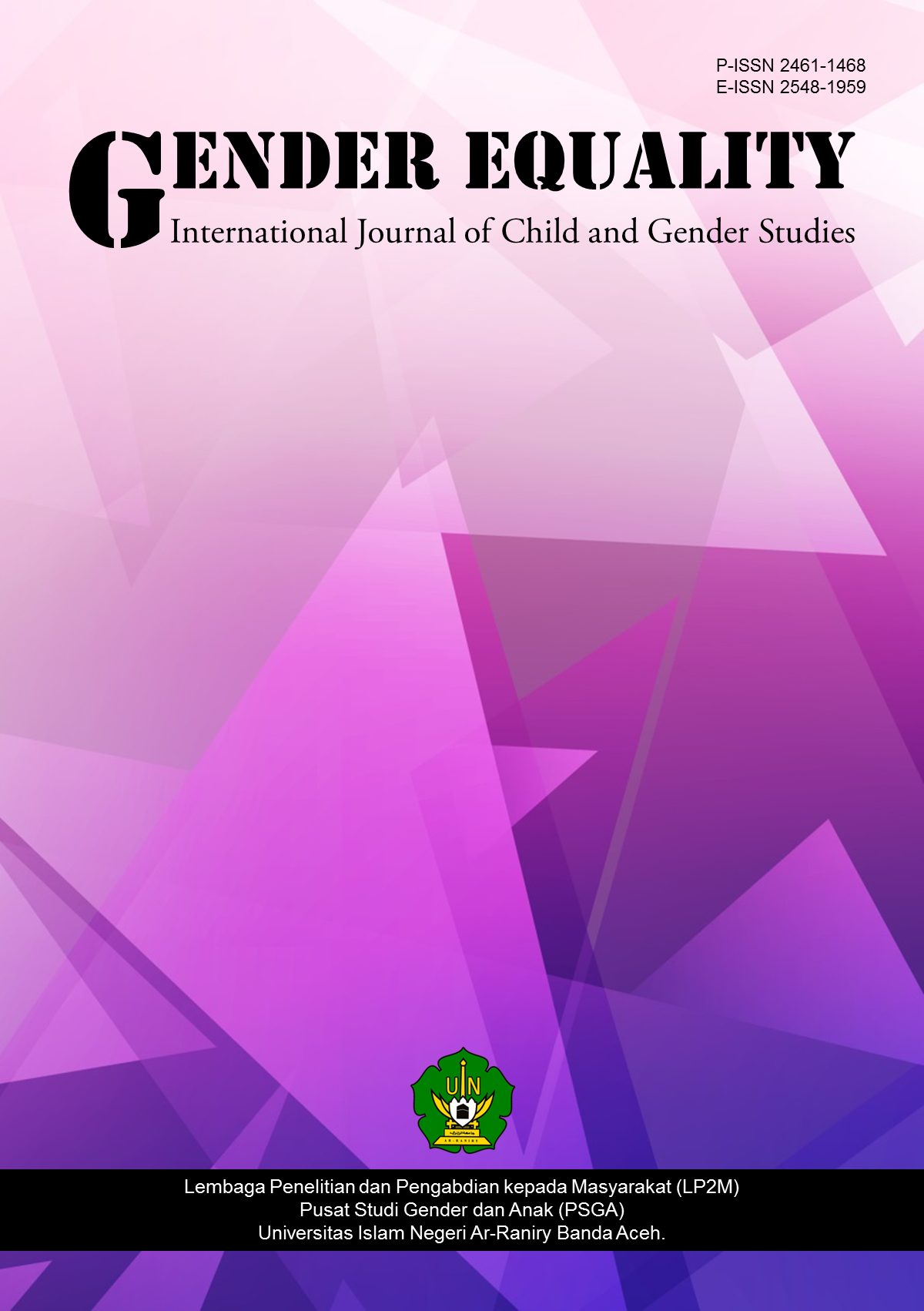Childfree in the perspective of Manhaj Tarjih Muhammadiyah: An analytic study of childfree with bayani, burhani, and irfani approaches
DOI:
https://doi.org/10.22373/equality.v10i1.19044Keywords:
Childfree, Manhaj, Tarjih of Muhammadiyah.Abstract
The decision not to have children (also known as childfree) is a Western lifestyle that is currently being debated. The concept is regarded as unnatural, contrary to human nature, and outside of the values held by society, particularly Indonesian. From an Islamic perspective, the concept of childfree opposes the shari'ah's goals (maqasid al syari’ah) namely hifzu an-nasl (protecting of offspring). This study focused on discussing about the concept of childfree based on the perspective of Manhaj Tarjih Muhammadiyah. Three basic questions discussed were 1) the history and background of the concept of childfree, 2) the perspective of the Muhammadiyah Tarjih and Tajdid Council and 3) the concept of childfree in the perspective of Manhaj Tarjih Muhammadiyah? The method used in this research is a qualitative method using library research through several primary sources such as the book "Childfree and Happy" by Victoria Tunggono, the book of "Manhaj Tarjih Muhammadiyah" written by Syamsul Anwar, Decisions of the Tarjih National Deliberation Muhammadiyah XXV in Jakarta and other secondary sources in the form of books, books, journals, or previous research. Based on research related to the concept of childfree, then analyzed using the bayani, burhani, and irfani approaches and a collection with hierarchical assumptions, namely basic values (al-qiyām al-assiyyah), general principles (al-uṣūl al-kulliyah) and practical legal provisions (al-ahkam al-far'iyyah), it can be concluded that the concept of childfree (the decision to not have children) is not justified in Islam.
References
______. (2020). Study hukum Islam Kontemporer bagian dua. Yogyakarta: UAD Press.
Abdurrahman, Asjumuni. (2012). Manhaj Tarjih Muhammadiyah, Yogyakarta: Pustaka Pelajar.
Abidin, Z. (2019). Nalar ‘irfānī: Tradisi pembentukan dan karakteristiknya. Ri'ayah: Jurnal Sosial dan Keagamaan, 4(01), 121-128.
Al-Huwayni, Abu Ishaq. (1987). al-Insyirah fi adab an-nikah, Beirut: Dar al-Kitab al-Arabiy.
Al-Utsaimin, Muhammad Shalih. (2000). az-Zawaj wa majmuatu as’ilah fii ahkamihi. Muassasah Syaikh Muhammad bin Shalih al-Utsaimin, Uzaynah.
Amri, M. S., & Tulab, T. (2018). Tauhid: Prinsip keluarga dalam Islam (Problem Keluarga Di Barat). Ulul Albab: Jurnal Studi Dan Penelitian Hukum Islam, 1(2), 95-134.
Anwar, Syamsul. (2018). Manhaj Tarjih Muhammadiyah. Yogyakarta: Panitia Musyawarah Nasional Tarjih Muhammadiyah XXX.
As-Sijistani, Abu Dawud Sulaiman bin Al-Asy’as bin Ishak bin Basyir bin Syidad bin Amar Al-Azdi. (2010). Sunan Abu Dawud, Al-maktabah Al-Ashriyah, Beirut: Al-Maktabah Asy-Syamilah.
At-Tahtawi. (2005). Syarh Kitab an-nikah, Lebanon: Dar al-Kutub al-Alamiyyah,
Collins Online Dictionary, 2021, https://www.collinsdictionary.com/dictionary/english/childfree accesed 13 Januari 2022.
Djamil, Fathurrahman. (1995). Metode ijtihad Majelis Tarjih Muhammadiyah, Jakarta: Logos Publishing.
Hadikusuma, W. (2018). Epistemologi bayani, irfani dan burhani al-Jabiri dan relevansinya bagi studi agama untuk resolusi konflik dan peacebuilding. Jurnal Ilmiah Syi'ar, 18(1).
Haecal, M. I. F., Fikra, H., & Darmalaksana, W. (2022). Analisis fenomena childfree di masyarakat: Studi takhrij dan syarah hadis dengan pendekatan hukum Islam. Gunung Djati Conference Series, (8), 219-233.
Haganta, K., Arrasy, F., & Masruroh, S. A. (2022). Manusia, terlalu (banyak) manusia: Kontroversi childfree di tengah alasan agama, sains, dan krisis ekologi. Konferensi Integrasi Interkoneksi Islam Dan Sains, 4(1), 309-320.
Indah, D. N., & Zuhdi, S. (2022). The childfree phenomenon in the perspective of human rights and maqashid al-shari’ah. International Conference on Community Empowerment and Engagement (ICCEE 2021), 222-231. Atlantis Press.
Karim, Muhammad Rusli, 1986, Muhammadiyah dalam kritik dan komentar. Jakarta: Rajawali.
Kurniawan, T., & Riyadi, F. (2021). Pendekatan bayani, burhani, dan irfani dalam menentukan awal waktu subuh di Indonesia. YUDISIA: Jurnal Pemikiran Hukum dan Hukum Islam, 12(1), 17-34.
Majelis Tarjih dan Tajdid Muhammadiyah. (2000). Keputusan Musyawarah Nasional Tarjih XXV di Jakarta.
Marfia, Sandra Milenia. (2022). Tren childfree sebagai pilihan hidup masyarakat kontemporer ditinjau dari perspektif pilihan rasional (Analisis pada media sosial grup childfree Indonesia. Skripsi. Surabaya: UIN Sunan Ampel.
Masjid Salman ITB. (2021). “Bolehkan Muslim ikut tren childfree?” https://twitter.com/salmanitb/status/1424627160225095680 accesed 20 Mei 2021.
Merriam Webster online Dictionary, 2021, https://www.merriam-webster.com/dictionary/child-free diakses tanggal 03 Desember 2021.
Muslikhati, Siti. (2004). Feminisme dan pemberdayaan perempuan dalam timbangan Islam. Jakarta: Gema Insani.
NU Online. (2021). “Hukum asli childfree dalam kajian fiqih Islam” https://islam.nu.or.id/post/read/130891/hukum-asal-childfree-dalam-kajian-fiqih-islam accesed 14 September 2021.
O’hera, Venus. (2020). “No kids: 40 good reasons not to have children-book review” https://youtu.be/IWPuiSk7254 accesed 2 November 2021.
Pimpinan Pusat Muhammadiyah, Majelis Tarjih dan Tajdid. (2018). Himpunan putusan Tarjih 3. Yogyakarta: Suara Muhammadiyah.
PP. Muhammadiyah (2005). Anggaran dasar Muhammadiyah. Yogyakarta: Suara Muhammadiyah.
Sabiq, Sayyid. (2000). Fiqh as-sunnah, Kairo: Darul Fath Lil I’lam Al-Arabi.
Suara Muhammadiyah. (2021) Metode asumsi hirarkis dalam Manhaj Tarjih, https://muhammadiyah.or.id/syamsul-anwar-terangkan-metode-asumsi-hirarkis-dalam-manhaj-tarjih/ accesed 03 Maret 2022.
Thohir, U. F., & Hikmiyah, H. H. (2018). Konsep keluarga dalam perspektif Al-Qur’an. Asy-Syari’ah: Jurnal Hukum Islam, 4(2), 203-222.
Tunggono, Victoria. (2021). Childfree and happy. Yogyakarta: EA Book.
Downloads
Additional Files
Published
Issue
Section
License
GENDER EQUALITY: International Journal of Child and Gender Studies allows the author(s) to hold the copyright and to retain the publishing rights without restrictions. Authors who publish with this journal agree to the following terms:
- Authors retain copyright and grant the journal right of first publication with the work simultaneously licensed under a Creative Commons Attribution License that allows others to share the work with an acknowledgment of the work's authorship and initial publication in this journal.
- Authors are able to enter into separate, additional contractual arrangements for the non-exclusive distribution of the journal's published version of the work (e.g., post it to an institutional repository or publish it in a book), with an acknowledgment of its initial publication in this journal.
- Authors are permitted and encouraged to post their work online (e.g., in institutional repositories or on their website) prior to and during the submission process, as it can lead to productive exchanges, as well as earlier and greater citation of published work.



